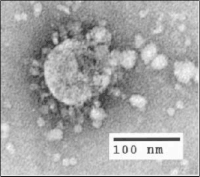
Photo from wikipedia
Purpose of review The coronavirus disease 2019 (COVID) pandemic has resulted in significant mortality and morbidity globally. Patients who survive infection may develop continuing disease collectively known as the postacute… Click to show full abstract
Purpose of review The coronavirus disease 2019 (COVID) pandemic has resulted in significant mortality and morbidity globally. Patients who survive infection may develop continuing disease collectively known as the postacute sequelae of severe acute respiratory syndrome coronavirus 2 infection (PASC), which includes neurologic symptoms especially fatigue and cognitive impairment. The pathogenic mechanisms driving PASC are unknown although a postinfectious process, persistent infection, or lasting pathophysiological changes that occur during acute infection are all suspected to contribute. Recent findings Here we review the current evidence underlying potential pathogenic mechanisms of the neurological complications of PASC with particular emphasis on the evidence for postinfectious immune processes and viral persistence. Summary Immune dysregulation favoring persistent inflammation, including neuroinflammation and enhanced autoimmunity, are present in patients with COVID and likely contribute to the development of PASC. Limited evidence of viral persistence exists but may explain the ongoing inflammatory processes and affinity maturation observed in some patients recovering from COVID infections. No specific studies to date have tied persistent infection to PASC. CNS trauma, in particular hypoxic changes in the CNS, and psychiatric complications occur with greater frequency in patients with COVID and may contribute to the development of PASC. Future research is needed to fully understand the pathophysiological mechanisms driving PASC.
Journal Title: Current Opinion in Neurology
Year Published: 2022
Link to full text (if available)
Share on Social Media: Sign Up to like & get
recommendations!